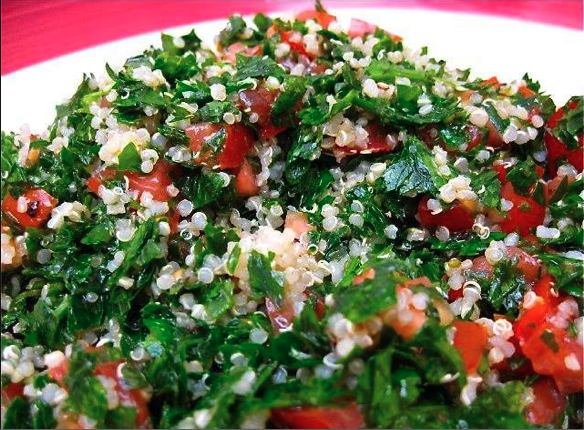
Gracie Diet pasta and salad platter: health for your Jiu-Jitsu / Photo: Carol Nakagawa/GRACIEMAG archives
Ever present on the recommended list of our columnist Adriana Gracie, the Mistura Viva web log is constantly serving up posts on the principles of proper eating as they pertain to keeping your body ailment free. Recently featured on the blog, six principles for proper eating, living healthier and having copious amounts of energy for dealing with your daily routine.
Click here for the full article in Portuguese. GRACIEMAG.com extracted the highlights and lists them below:
1. BREATHE BETTER AND FLUSH OUT TOXINS
Not a lot of Jiu-Jitsu practitioners pay due attention to their breathing. Make note of how oxygenizing your organism is directly linked to daily health and vigor.
“Lack of oxygen is significant in that it can cause cells to become cancerous. It surely affects the cell’s quality of life,” reads one snippet from the blog.
The lymphatic system gets activated by deep breathing. Practicing deep breathing and exercises like yoga eliminate 15 times more toxins from the body than does normal, hurried breathing, says the article.
2. EAT FOODS RICH IN WATER!
Remember: your quality of life is dependent on the quality of life of your cells. So straight to the nitty-gritty: fresh fruit, greens, legumes, sprouts and plenty of water.
“Your diet should include foods consisting of 70% water. The lower the level of water, the greater the likelihood of you contracting imbalances (illnesses),” says the article.
3. CHOOSE YOUR FOOD COMBINATIONS WISELY
“Take care of your stomach for your first 50 years, and it will take care of you for the next 50,” is Dr. Steven Smith’s take on how to stay healthy.
Eat meat and potatoes at the same time? Bread and cheese, milk and cereal, fish and rice? What if you were told these combinations are totally destructive to your digestive system and sap your energy?
Eat just one condensed food per meal. What’s condensed food? Any ingestible not rich in water. For example, beef jerky is condensed, while watermelon is rich in water.
Make sure not to eat starch, carbohydrates and protein in the same meal.
4. EAT LITTLE, AND CAREFUL ABOUT LIQUIDS DURING MEAL TIMES
Are you dragging your feet when you get out of bed in the morning, even if you got your full eight hours’ worth of sleep? Know why? While you’re sleeping, your body is working overtime to digest the incompatible food combinations you put in your belly.
Eat light before going to bed, just enough to keep from feeling hungry. If you feel like eating a lot of something, eat a lot of salad. And after 9pm eat just fruit. Remember: after ingesting a properly combined meal, you should wait for at least three hours before eating anything else.
It’s important that you keep in mind that drinking during meal time dilutes your digestive juices and slows down the digestive process; so don’t drink much water, especially not cold water.
5. EAT MORE FRUIT!
Fruit is the most perfect food on the planet, since it takes the least energy to digest and gives your body the maximum return. Least effort for maximum benefit—have you heard that here on GRACIEMAG.com before?
“The only food that makes your brain work is glucose. Fruit is packed with fructose, which is easily converted into glucose. Most of the time, it is 90-95% water, which means it cleanses you and feeds you at the same time.
Eat fruit upon getting up in the morning and on an empty stomach. Your heart and overall health will thank you for it.
6. EAT LESS PROTEIN!
The percentage of protein in a human mother’s milk doesn’t exceed 2.38. Did you know that? So where did this idea that we need loads of protein to be strong and healthy come from?
Dr. Mark Hegstead, a Professor of nutrition at Harvard Medical School, asserts that most human beings seem to adapt to whatever quantity of protein is available to them. In other words: if you eat a well-balanced vegetarian diet, you’ll get all the protein you need!
To be sure you have energy for training, all you need is glucose from fruits, vegetables and sprouts.
But what about the myth that protein is good for endurance? “Wrong. Too much protein overloads your system with nitrogen, which causes fatigue,” says the article. “And as for protein strengthening our bones? Wrong again. Excess protein has been linked to osteoporosis, degeneration and weakening of the bones. The strongest bones in the world belong to vegetarians.”
Milk and meat just clog up your body. For your supply of calcium, go with green vegetables, nuts, sesame seed, turnips. And you can have small quantities of white cheese on salad.
How about it, gentle reader, learned something new? Now what boosts your energy levels in training. Share with us, using the comments field below.




